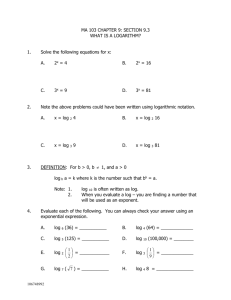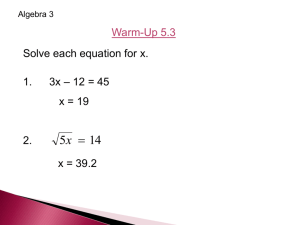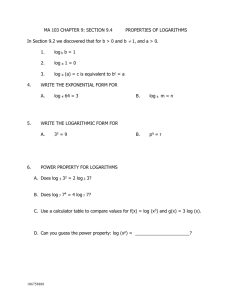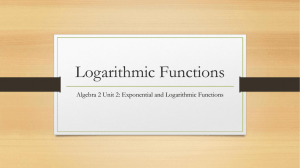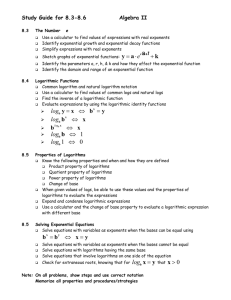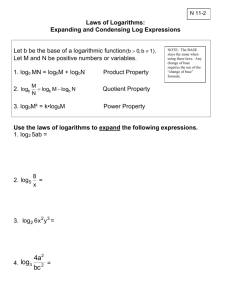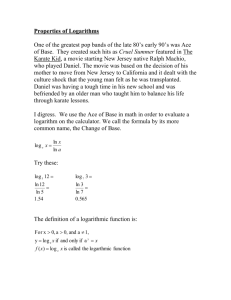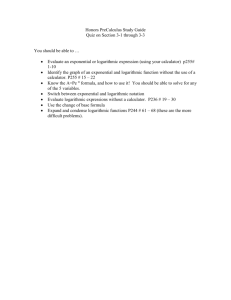4.2 - Logarithmic Functions
advertisement
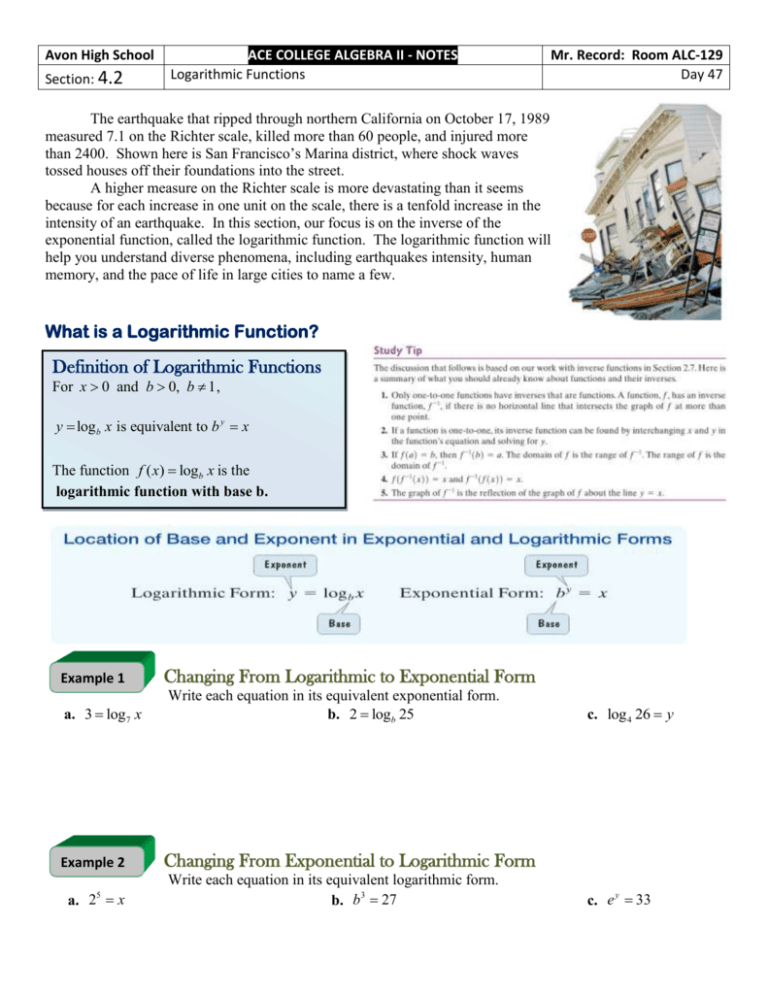
Avon High School Section: 4.2 ACE COLLEGE ALGEBRA II - NOTES Logarithmic Functions Mr. Record: Room ALC-129 Day 47 The earthquake that ripped through northern California on October 17, 1989 measured 7.1 on the Richter scale, killed more than 60 people, and injured more than 2400. Shown here is San Francisco’s Marina district, where shock waves tossed houses off their foundations into the street. A higher measure on the Richter scale is more devastating than it seems because for each increase in one unit on the scale, there is a tenfold increase in the intensity of an earthquake. In this section, our focus is on the inverse of the exponential function, called the logarithmic function. The logarithmic function will help you understand diverse phenomena, including earthquakes intensity, human memory, and the pace of life in large cities to name a few. What is a Logarithmic Function? Definition of Logarithmic Functions For x 0 and b 0, b 1 , y log b x is equivalent to b y x The function f ( x) logb x is the logarithmic function with base b. Example 1 Changing From Logarithmic to Exponential Form a. 3 log7 x Write each equation in its equivalent exponential form. b. 2 logb 25 Example 2 Changing From Exponential to Logarithmic Form a. 2 x 5 Write each equation in its equivalent logarithmic form. b. b 3 27 c. log 4 26 y c. e y 33 Example 3 Evaluating Logarithms Evaluate: b. log 5 a. log10 100 1 125 d. log3 7 3 c. log 36 6 Basic Logarithmic Properties Basic Logarithmic Properties Involving One 1. logb b 1 because 1 is the exponent to which b must be raised to obtain b. (b1 b) 2. logb 1 0 because 0 is the exponent to which b must be raised to obtain 1. (b0 1) Investigation: What is the inverse of y b x ? Inverse Properties of Logarithms For x 0 and b 0, b 1 , log b b x x b logb x x Example 4 a. log9 9 The logarithm with base b of b raised to a power equals that power. b raised to the logarithm with base b of a number equals that number. Evaluating Logarithms Evaluate: b. log 8 1 c. log 7 78 d. 3log3 17 Graphs of Logarithmic Functions Example 5 Graphs of Exponential and Logarithmic Functions Graph f ( x) 2 x and g ( x) log 2 x in the same rectangular coordinate system. y x Characteristics of Logarithmic Functions of the Form f (x )=logb(x) The domain of f ( x) logb x consists of all positive real numbers: (0, ) . The range of f ( x) logb x consists of all real numbers: (, ) . 2. The graphs of all exponential functions of the form f ( x) logb x pass through the point (1, 0) because f (1) logb 1 0 . The x-intercept is 1. There is no y-intercept. 3. If b 1, f ( x) logb x has a graph that goes up to the right and is an increasing function. If 0 b 1 , f ( x) logb x has a graph that goes down to the right and is 1. a decreasing function. f ( x) b x is one-to-one and has an inverse that is a function. 4. The graph of f ( x) logb x approaches, but does not touch, the y-axis. The y-axis, or x 0 , is a vertical asymptote. Transformations of LogarithmicFunctions The graphs of logarithmic functions can be translated vertically or horizontally, reflected, stretched, or shrunk just as polynomial, rational and exponential functions. Table 4.4 on page 429 of your text summarizes these transformations. TI-Nspire Activity: “Follow that Logarithmic Function” The Domain of a Logarithmic Function Example 6 Finding the Domain of a Logarithmic Function Find the domain of f ( x) log 4 ( x 5) . Common Logarithms The logarithmic function with base 10 is called the common logarithmic function. The function f ( x) log10 x is almost always written as f ( x) log x . Finding common logarithms on a scientific or graphing calculator is rather easy. However, the sequence of key strokes varies by calculator manufacturer and model. Example 7 Modeling Height of Children The percentage of adult height attained by a boy who is x years old can be modeled by f ( x) 29 48.8log( x 1) where x represent the boy’s age and f ( x) represents the percentage of his adult height. Approximately what percentage of his adult height has a boy attained at age ten? Properties of Common Logarithms General Properties Common Logarithms 1. logb 1 0 2. logb b 1 1. log1 0 2. log10 1 3. log b b x x 3. log10x x 4. b log b x x 4. 10log x x Example 8 Earthquake Intensity The magnitude, R, on the Richter scale of an earthquake with intensity I is given by I R log , I0 where I 0 is the intensity of a barely felt zero-level earthquake. The earthquake that destroyed San Francisco in 1906 was 108.3 times as intense as a zero-level earthquake. What was its magnitude on the Richter scale? Natural Logarithms The logarithmic function with base e is called the natural logarithmic function. The function f ( x) log e x is almost always written as f ( x) ln x . Can you find the “ln” key on your calculator? Example 9 Finding Domains of Natural Logarithmic Functions Find the domain of each function: a. f ( x) ln(4 x) b. f ( x) ln x 2 Properties of Natural Logarithms General Properties Natural Logarithms 1. logb 1 0 2. logb b 1 1. ln1 0 2. ln e 1 3. log b b x x 3. ln e x x 4. b log b x x 4. eln x x Example 10 Dangerous Heat When the outside air temperature is anywhere from 72 to 96 Fahrenheit, the temperature in an enclosed vehicle climbs by 43 in the first hour. The bar graph to the right shows the temperature increase throughout the hour. The function T ( x) 13.4 ln x 11.6 models the temperature increase, T ( x ) , in degrees Fahrenheit, after x minutes. Use the function to find the temperature increase, to the nearest degree, after 30 minutes. How well does the function model the actual increase shown in the bar graph?
